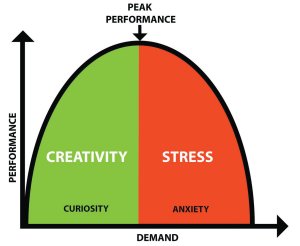Close your eyes and count to ten
Unleashing the power of your mind can optimise performance in times of stress, as Danny Hearty has discovered.

1. Pay attention to what is actually going on around you and inside you
Time out – and really looking at the world – allowed my head to clear away all the other things going on and to recharge my batteries. Then my mind could do its job, to make connections and see a way forward. In recent years there have been numerous books delving into neuroscience, looking at how we can use our minds more effectively to improve performance and enhance well-being. As demand on us grows, our capacity to respond increases. However, if the demand continues relentlessly, our capacity begins to wane. Some healthy stress improves physical and mental functioning. Without it we become bored and disengaged. Too much stress becomes distress, which leads to tiredness, irritability, illness, and lack of energy and motivation. There is an optimal point of peak performance, when demands have stimulated our engagement, where we feel stretched and creative. The Yerkes-Dodson Curve (pictured) depicts this process. Keeping ourselves at the tip, and encouraging others to function at this point, is our challenge. To hold this position, we obviously need to look at the amount demanded of us. It is also worth paying attention to what is going on in our minds.
2. Curiosity v. Anxiety
“You cannot be curious and anxious at the same time” indicates that if we become anxious, we turn inwards and look outside only for problems. We are no longer able to be openly curious and observant. Stress in the form of real or imagined danger stimulates the sympathetic nervous system, the part of the brain that releases adrenalin, triggering the ‘fight or flight’ response. This stimulation produces physiological responses, many of which are helpful: we become alert and take action. If it continues, however, concentration and memory falter, we become tired, indecisive, anxious and unwell. We are less able to learn and take in experiences and to break the downhill spiral. While this part of the brain accelerates the body, another part, the parasympathetic nervous system, acts as its brake. In earlier times, stressful events like hunting or fighting were followed by periods of rest, with repairing, playing and socialising. This allowed the body to recover and renew itself. Hormones are released that relax the body, lower blood pressure and strengthen the immune system. This stimulation improves memory and enhances curiosity, allowing new learning and leading to feelings of optimism and happiness. We want to be kind to ourselves and others. We become more productive. I heard Paul O’Grady recently describe himself as having two speeds: frantic and manic. This could apply to many of us. The problem for our bodies these days is that worrying about meeting a funding deadline or needing to speak at a meeting. Even an imagined occurrence will trigger the sympathetic nervous system just as if a wild beast were approaching. So, the more we can do to transform this heightened alert into calmness, the better.
3. Close your eyes and count to ten
The song pointed me towards an activity anyone can do to help them be calm and energised. Find somewhere to be silent for a minute. Preferably somewhere alone, even if that means escaping to the loo. Sit upright, place your feet firmly on the ground, slightly apart. Close your eyes. Then simply breathe deep breaths in and out ten times, for roughly a minute. Count them. Some people may need only six breaths to fill a minute and others may need fifteen. The point is to focus only on your breathing. If other thoughts come, just keep your mind on breathing and counting and they will slip away. This will stimulate the parasympathetic nervous system. It will calm and ground you and release energy. Often we beat ourselves up when our minds wander off and we force ourselves back to concentrating on the task or person in hand. Our minds are actually trying to help us – to signal a link, point to a way forward, tune into another’s emotion or hint that its time to recharge. The more we can trust and use this power, the more it will offer. A tree casting a shadow worked for me, and, more famously, an apple falling from a tree worked for Isaac Newton. It will be something else for you, if you let it.

Join the Discussion
You must be logged in to post a comment.